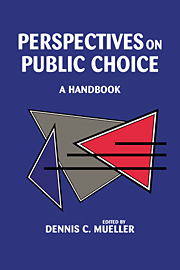Book contents
- Frontmatter
- Contents
- Preface
- Contributors
- 1 Public choice in perspective
- Part I The need for and forms of cooperation
- Part II Voting rules and preference aggregation
- 7 Cycling and majority rule
- 8 Majority rule
- 9 Group choice and individual judgments
- 10 Some paradoxes of preference aggregation
- 11 Voting and the revelation of preferences for public activities
- Part III Electoral politics
- Part IV Individual behavior and collective action
- Part V Public choice in action
- References
- Name index
- Subject index
9 - Group choice and individual judgments
Published online by Cambridge University Press: 04 May 2010
- Frontmatter
- Contents
- Preface
- Contributors
- 1 Public choice in perspective
- Part I The need for and forms of cooperation
- Part II Voting rules and preference aggregation
- 7 Cycling and majority rule
- 8 Majority rule
- 9 Group choice and individual judgments
- 10 Some paradoxes of preference aggregation
- 11 Voting and the revelation of preferences for public activities
- Part III Electoral politics
- Part IV Individual behavior and collective action
- Part V Public choice in action
- References
- Name index
- Subject index
Summary
Optimal group decisions
Methods of voting have been used since ancient times. The systematic study of voting rules, however, and the search for a “best” rule originated in eighteenth-century France. The stimulus for much of the thinking in this period is the following famous passage from Rousseau's The Social Contract:
When a law is proposed in the people's assembly, what is asked of them is not precisely whether they approve of the proposition or reject it, but whether it is in conformity with the general will … each by giving his vote gives his opinion on this question, and the counting of the votes yields a declaration of the general will. When, therefore, the opinion contrary to my own prevails, this proves only that I have made a mistake, and that what I believed to be the general will was not so. (153)
This idea was given a more precise formulation some twenty years later by the mathematician and political philosopher Marie Jean Antoine Nicolas Caritat, Marquis de Condorcet. Like Rousseau, Condorcet began with the premise that the object of voting is to discover what decision or choice is in the best interest of society. Unlike Rousseau, he provided a logically coherent framework within which to analyze this issue (Grofman and Feld 1988; Young 1988). Suppose that a group of n individuals must make a decision between two alternatives a and b, one of which is in fact better than the other. (Whether this is a meaningful assumption will be considered below.)
- Type
- Chapter
- Information
- Perspectives on Public ChoiceA Handbook, pp. 181 - 200Publisher: Cambridge University PressPrint publication year: 1996
- 7
- Cited by



